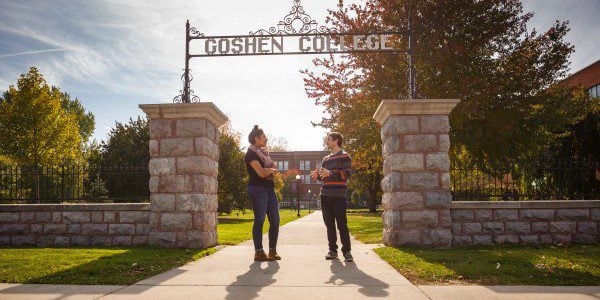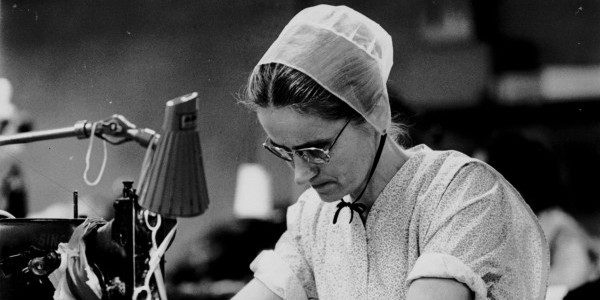The Coalition of Christian Colleges and Universities (CCCU) has announced today (via a statement on its website) the long-awaited decision regarding what to do about Eastern Mennonite University and Goshen College. These are the two historic Mennonite colleges that recently adopted inclusive (anti-discrimination) hiring policies for gay and lesbian persons.

This bold change put them out of step with the majority of CCCU institutions and with the CCCU’s own inernal hiring policy. It also caused a bit of a furor within the Coalition, and led to the withdrawal of two schools (Union University and Oklahoma Wesleyan University) from membership in the CCCU. These schools voiced their disapproval of CCCU’s discernment and communication process.
But the process went on nonetheless–though without Union and Oklahoma Wesleyan in the mix. And today the CCCU concluded that process by informing coalition presidents and the media of the membership status of EMU and Goshen.
Many were anticipating a recommendation to downgrade the membership status of EMU and Goshen to “affiliate member,” meaning they would no longer be full members and would no longer have voting rights. As it turns out, that probably would have been the result, except that EMU and Goshen decided to resign before that decision was finally made.
Here is the main gist of the final outcome, taken directly from the statement on the CCCU website:
The Board completed its consultative process in early September, having spoken to all but one member president, due to scheduling constraints. In these conversations, many member presidents expressed their initial observations, rather than settled opinions on this issue, and many had questions about the CCCU’s different associational categories. In general, however, based on the current categories of association available, approximately 75 percent of members agreed in full or in principle with the Board’s recommendation to consider moving EMU and Goshen to non-member affiliate status. Nearly 20 percent of the member presidents felt that EMU and Goshen should continue in full membership, while less than 25 percent did not support either member or affiliate status. These numbers reflect that some presidents felt comfortable with more than one option.
Throughout this consultation period, the CCCU Board made clear that it never considered changing the CCCU’s own employment practice, student conduct policies, core advocacy position or public policy commitments. While almost all presidents expressed support for the Board’s expedited due-diligence and appreciated being consulted, two institutions, Union University and Oklahoma Wesleyan University (OKWU), voiced concern with the process and withdrew membership.
While EMU and Goshen were supportive of the Board’s consultation and wanted time to also consider the possibility of affiliate membership, both schools have been clear from the outset that they did not want to be the cause of significant division within the membership. Following completion of the Board’s member inquiry and multiple discussions with Council leadership, both EMU and Goshen voluntarily chose to tender their withdrawals from member status with the CCCU. The Council Board acknowledged their withdrawals at its September 15 meeting rendering the question of affiliate status moot. At various points during the process, the CCCU had requested that any institution considering separation from the association delay a final decision until the Board concluded its evaluation.
Here’s my quick, outside-observer take: The CCCU dodged a bullet here. Or rather, EMU and Goshen took bullets for the CCCU. By sacrificing themselves, pulling out of the CCCU completely, rather than accept a change to affiliate status, they relieved the pressure which had built up within the coalition. Remaining within the CCCU as a “demoted” member (or semi-member?) would have kept them in the tribe and forced the continuation of uneasy relationships and heightened conflict. It would have kept same sex marriage and the compatibility of Christian faith and LGBTQ identity as a live question within the Coalition.
But it turns out that the question is just too hot to handle for these conservative schools.
The desire of some within the Coalition to expunge EMU and Goshen from the group (the category “less than 25% of presidents”), and the counter-desire of still others to support them (the category 20% of presidents who supported their full membership), would have made for some tension-filled moments. But rather than perpetuate the conflict (and possibly be scapegoated by the tribe), the two schools sacrificed themselves on behalf of peace of the group–so to speak.
As someone with long-time affiliations with CCCU schools, I am saddened by this result. I interpret the resignation of EMU and Goshen from the CCCU as a big loss. It may seem like a win for the fundamentalists and for those who insist that “historic Christianity” must include explicit and formalized discrimination against LGBTQ persons. But a coalition of academic (mainly liberal arts) institutions should be the context where complicated questions are faced openly and where disagreement can be seen as a sign of healthy dialogue. The message communicated by this development is that dialogue on this issue (perhaps the most divisive issues in Christianity today) is just not going to happen.
I understand and appreciate the decisions of EMU and Goshen to resign from the CCCU. On one hand, I wish their resignations had been refused by the CCCU leadership and the majority of its member schools. It would have made for a healthier CCCU and could have set the table for the CCCU to lead out among conservative Christian institutions, churches, and denominations in facing this issue.
On the other hand, perhaps one can be glad for further clarity regarding the position of the CCCU and its (remaining) member schools on this issue. The borders seem clear; the lines have been drawn.
For more posts and discussions on theology and society, like/follow Unsystematic Theology on Facebook












